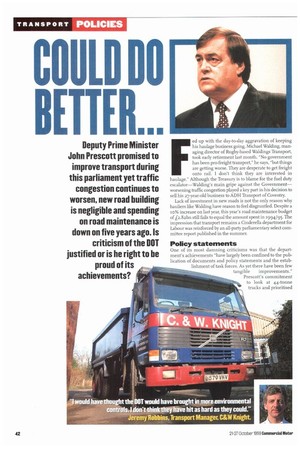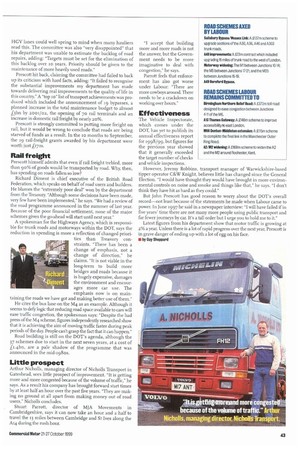ULD DO ITER...
Page 44

Page 45

If you've noticed an error in this article please click here to report it so we can fix it.
Deputy Prime Minister John Prescott promised to improve transport during this parliament yet traffic congestion continues to worsen, new road building is negligible and spending on road maintenance is down on five years ago. Is criticism of the DOT justified or is he right to be proud of its achievements?
Fed up with the day-to-day aggravation of keeping his haulage business going, Michael Walding, managing director of Rugby-based Waldings Transport, took early retirement last month. "No government has been pro-freight transport," he says, "but things are getting worse. They are desperate to get freight onto rail. I don't think they are interested in haulage." Although the Treasury is to blame for the fuel duty escalator—Walding's main gripe against the Government— worsening traffic congestion played a key part in his decision to sell his 27-year-old business to ADH Transport of Coventry.
Lack of investment in new roads is not the only reason why hauliers like Walding have reason to feel disgruntled. Despite a io% increase on last year, this year's road maintenance budget of i2.82bri still fails to equal the amount spent in 1994/95. The impression that transport remains a Cinderella department for Labour was reinforced by an all-party parliamentary select committee report published in the summer.
Policy statements
One of its most damning criticisms was that the department's achievements "have largely been confined to the publication of documents and policy statements and the establishment of task forces. As yet there have been few tangible improvements." Prescott's commitment to look at 44-tonne
trucks and prioritised
HGV lanes could well spring to mind when many hauliers read this. The committee was also "very disappointed" that his department was unable to estimate the backlog of road repairs, adding: "Targets must be set for the elimination of this backlog over io years. Priority should be given to the maintenance of more heavily used roads."
Prescott hit back, claiming the committee had failed to back up its criticism with hard facts, adding: "It failed to recognise the substantial improvements my department has made towards delivering real improvements to the quality of life in this country." A "top ro" list of transport achievements was produced which included the announcement of 19 bypasses, a planned increase in the total maintenance budget to almost L3bn by 2001/02, the opening of 70 rail terminals and an increase in domestic rail freight by nearly zo%.
Prescott is strongly committed to putting more freight on rail, but it would be wrong to conclude that roads are being starved of funds as a result. In the ro months to September, the 19 rail-freight grants awarded by his department were worth just L17m.
Rail freight
Prescott himself admits that even if rail freight trebled, more than 90% of goods would be transported by road. Why, then, has spending on roads fallen so low?
Richard Diment is chief executive of the British Road Federation, which speaks on behalf of road users and builders. He blames the "extremely poor deal" won by the department from the Treasury. "Although some decisions have been made, very few have been implemented," he says. "We had a review of the road programme announced in the summer of last year. Because of the poor financial settlement, none of the major schemes given the go-ahead will start until next year."
A spokesman for the Highways Agency, which is responsible for trunk roads and motorways within the DOT, says the reduction in spending is more a reflection of changed priorities than Treasury constraints. "There has been a change of emphasis, not a change of direction," he claims. "It is not viable in the long-term to build more bridges and roads because it is hugely expensive, damages the environment and encourages more car use. The emphasis now is on maintaining the roads we have got and making better use of them."
He cites the bus lane on the M4 as an example. Although it seems to defy logic that reducing road space available to cars will ease traffic congestion, the spokesman says: "Despite the bad press of the M4 scheme, figures independently researched show that it is achieving the aim of moving traffic faster during peak periods of the day. People can't grasp the fact that it can happen."
Road building is still on the DOT's agenda, although the 37 schemes due to start in the next seven years, at a cost of ii.4bn, are a pale shadow of the programme that was announced in the mid-198os.
Lithe prospect
Arthur Nicholls, managing director of Nicholls Transport in Gateshead, sees little prospect of improvement. "It is getting more and more congested because of the volume of traffic," he says. As a result his company has brought forward start times by at least half an hour over the past five years. "They are making no ground at all apart from making money out of road users," Nicholls concludes.
Stuart Parrott, director of MJA Movements in Cambridgeshire, says it can now take an hour and a half to travel the 13 miles between Cambridge and St Ives along the Ar4 during the rush hour. "I accept that building more and more roads is not the answer, but the Government needs to be more imaginative to deal with congestion," he says.
Parrott feels that enforcement has also got worse under Labour: "There are more cowboys around. There needs to be a crackdown on working over hours."
Effectiveness
The Vehicle Inspectorate, which comes under the DOT, has yet to publish its annual effectiveness report for 1998/99, but figures for the previous year showed that it generally exceeded the target number of checks and vehicle inspections.
However, Jeremy Robbins, transport manager of Warwickshire-based tipper operator C8LW Knight, believes little has changed since the General Election. "I would have thought they would have brought in more environmental controls on noise and smoke and things like that," he says. "I don't think they have hit as hard as they could."
But John Prescott has good reason to worry about the DOT's overall record—not least because of the statements he made when Labour came to power. In June i997 he said in a newspaper interview: "I will have failed if in five years' time there are not many more people using public transport and far fewer journeys by car. It's a tall order but I urge you to hold me to it."
Latest figures from his department show that motor traffic is growing at 2% a year. Unless there is a lot of rapid progress over the next year, Prescott is in grave danger of ending up with a lot of egg on his face.
• byiySheçpard
ROAD SCHEMES AXED BY LABOUR
Salisbury Bypass/Wessex U* A £137m scheme to upgrade sections of the MO, A36, A46 and A303 trunk roads.
An improvements: A £73m contract which included upgrading 15 miles of trunk road to the west of London. Motorway widening: The M1 between Junctions 10-14; the M5 between Junctions 17-21; and the M25 between Junctions 15-19.
£49 Hereford Bypass.
ROAD SCHEMES LABOUR REMAINS COMMITTED TO
Birmingham Northern Relief Road: A £370m toll road designed to ease congestion between Junctions 4-11 of the M6.
111PRIOS Gateway: A £146m scheme to improve accessibility to east London.
MN Denton-Middleton extension: A 1115m scheme to complete the final link in the Manchester Outer Ring Road.
A2/B12 widening A £1613m scheme to widen the A2 and the M2 around Rochester, Kent.












































































































